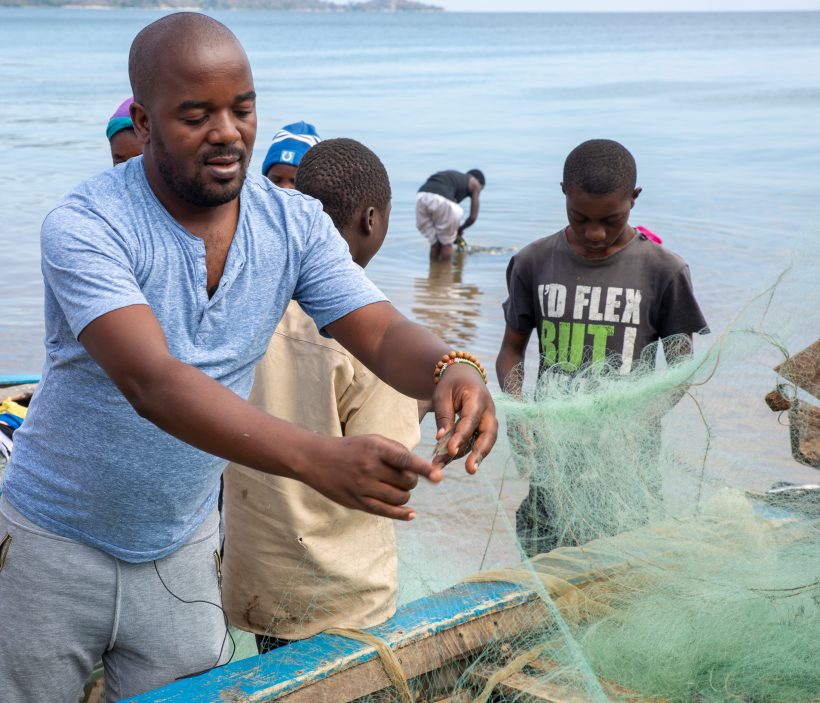
James John Banda, a 2021 One Planet Laureate Candidate, and the fishing community at Monkey Bay landing site on the shores of Lake Malawi
As we commemorate World Water Week 2024 under the theme ‘Bridging Borders: Water for a Peaceful and Sustainable Future’, our top 10 reads this month features some of the African Women in Agricultural Research for Development (AWARD) Fellows who work in aquatic sciences and water management in Africa.
We spotlight the innovations and ongoing research the Fellows are working on that aim to contribute to sustainable irrigation, water governance, and gender-responsive water management systems across the continent.
Dr. Patricia Oteng-Darko is a Soil and Water Engineer at the Council for Scientific and Industrial Research-Ghana (CSIR-Ghana) and a 2018 AWARD Fellow from Ghana. She is part of a team of researchers that published a peer-reviewed factsheet outlining six (6) factors farmers should consider in irrigation.
Fisheries and aquaculture production are steadily declining in Malawi because of the growing population and unsustainable fishing and post-harvest handling techniques by fish farmers. John James Banda, an Aquaculture researcher and 2021 One Planet Laureate Candidate from Malawi, developed a climate-smart drying technological innovation to address the post-handling process specifically for marginalized women fish farmers in Malawi.
The study focuses on the impact of the disruptions in the global supply chain caused by the COVID-19 pandemic on the availability of inputs to fish farmers in Benin. Dr. Toundji Olivier Amoussou, Fisheries Scientist and 2019 One Planet Laureate Candidate from Benin, led a team of eight researchers to identify and propose mitigating factors and local solutions that would help small-scale fish farmers adapt to future supply chain shocks such as the pandemic.
Flower Msuya, a 2014 AWARD Fellow and Marine Biologist from Tanzania, works with marginalized women to increase their income by producing seaweed value-added products. Her research focuses on developing innovative seaweed farming technologies and resilience for coastal communities to address challenges in aquaculture caused by the effects of climate change.
Assessing water abstraction for irrigation is essential for monitoring water needs for agriculture across different cropping seasons. This helps conservationists manage water resources and design interventions to conserve water catchment areas, preventing the drying up of water sources. Dr. Anna Msigwa is a 2020 One Planet Laureate Candidate from Tanzania and a Researcher and Lecturer in Hydrology and Water Resource Engineering at the Nelson Mandela African Institution for Science and Technology (NM-AIST). She led a study employing a geological imaging program to map out water abstraction for irrigation across different cropping seasons at the upper Pangani catchment in Tanzania.
Participatory natural resource governance ensures that the needs of communities dependent on the resource for their livelihood and sustenance are accounted for when governance stakeholders develop conservation strategies. Douglas Ombogoh Bwire, a Research Officer at CIFOR-ICRAF and a 2020 One Planet Laureate Candidate, conducted a study to explore the challenges and opportunities for community participation in forest and water management in Kenya. His study sought to establish, among others, how is gender integrated? What are the barriers to implementation? How can content and implementation be improved to support joint forest and water management?
Dr. Offoro Kimambo is an Ecohydrologist and a 2019 One Planet Laureate Candidate from Tanzania. He received a USD 14,000 grant to assess the environmental flow in the Rufiji Basin. Water scarcity is increasingly threatening biodiversity and the livelihood of downstream communities in the largest river in Tanzania. His study outlines recommendations for the sustainable use of the water body by establishing a recommended environmental flow that would inform the basin’s policies and management.
Ebinimi Ansa, an Aquaculture researcher and 2011 AWARD Fellow, devised an innovative approach to help rural fish farmers in Southern Nigeria cut their feeding costs by 15%. This involves incorporating winged insects as an alternative feed source to the rapidly declining fishmeal. Given the primacy of fish as a food source for the population, this will help address food insecurity in the region.
The aquaculture sector is rapidly growing in Sub-Saharan Africa, increasing pressure to identify consistent sources of fishmeal for smallholders in the region. Rose Basiita Komugisha, a 2008 AWARD Policy Fellow from Uganda and Aquaculture Scientist at WorldFish Centre teamed up with fellow aquaculture researchers to investigate the viability of replacing wild fish catches to produce fishmeal with dry yeast (DY-Pro). They hypothesize that this will help reduce pressure on wild fish catches and offer smallholder farmers an alternative and sustainable source of fishmeal.
Population growth, agricultural activities, and industrialization increasingly threaten water bodies in Ethiopia. Hydrological scientists have increased efforts in the last few years to address water insecurity arising from the causes above. One such researcher addressing this growing crisis is Dr. Abera Worku Wuletawu, a Senior Scientist at the Alliance of Bioversity International and the International Center for Tropical Agriculture (CIAT) and a 2020 One Planet Laureate Candidate from Ethiopia. He analyzed 10 major lakes in Ethiopia over 38 years to establish the changes in surface area water and future water trends in the adjacent areas.
